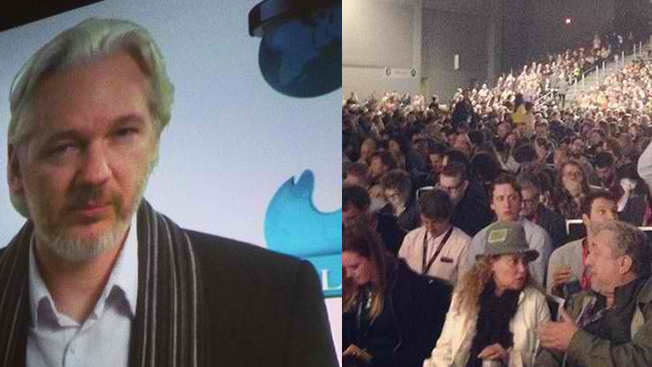Julian Assange has a message for the countries he believes have tried to systematically squash the kind of national security reporting he has become known for: Your plan has backfired.
The WikiLeaks founder, under political-legal asylum at the Ecuadorian Embassy in London, spoke via Skype today to a South by Southwest Interactive audience of roughly 3,000.
"National security reporters are the new refugee," he said. "I see this as quite a positive phenomenon where people would have been completely crushed and not able to work anymore, they are able to use basic tenets of classic liberalism such as freedom of movement … to keep working."
He listed Edward Snowden, Glenn Greenwald, Jacob Appelbaum, Sarah Harrison and Laura Poitras in terms of whistle-blowers and journalists who have gone into exile in places like Brazil or Berlin. These developments, Assange said, have actually "created a strong nucleus of reporting communities."
He also said the NSA—which for years had run a "no comment" public relations strategy—was not prepared for the international response to the documents Snowden revealed after his days as a contractor with the agency. "The Pentagon has [always had] that strategy of trotting out soldiers wrapped in flags trying to demonstrate bravery, but the NSA didn't have that strategy," Assange commented. "We got lucky, because we ended up with an opponent that didn't have a PR strategy."
In recent years, Assange's WikiLeaks has disclosed droves of classified data about U.S. military and diplomatic efforts. He said his group was about to release more secret information that will draw interest, while not going into details.
"I don’t think it’s right to give the perpetrator the heads up," Assange said.
Meanwhile, he was interviewed by Barbarian Group co-founder Benjamin Palmer in a situation that promised a couple of awkward exchanges going in since the latter's agency hails from a community that wants all the consumer data it can get its hands on. But alas, there weren't any—outside Assange's typical calling out of Facebook and Google for being too cozy with the U.S. government.
The Q&A session was rather uneventful as well. Assange wasn't at all challenged by attendees who disagreed with his mission, tactics, etc.
Lastly, here are a few other intriguing comments from Assange:
- "The Internet has become a political space. I think that is the most important transformation of the past decade."
- On his stay at the Ecuadorian Embassy in London: "It is a bit like being a prisoner."
- Though he said he met with Pulitzer Prize-winning novelist Alice Walker this morning.








